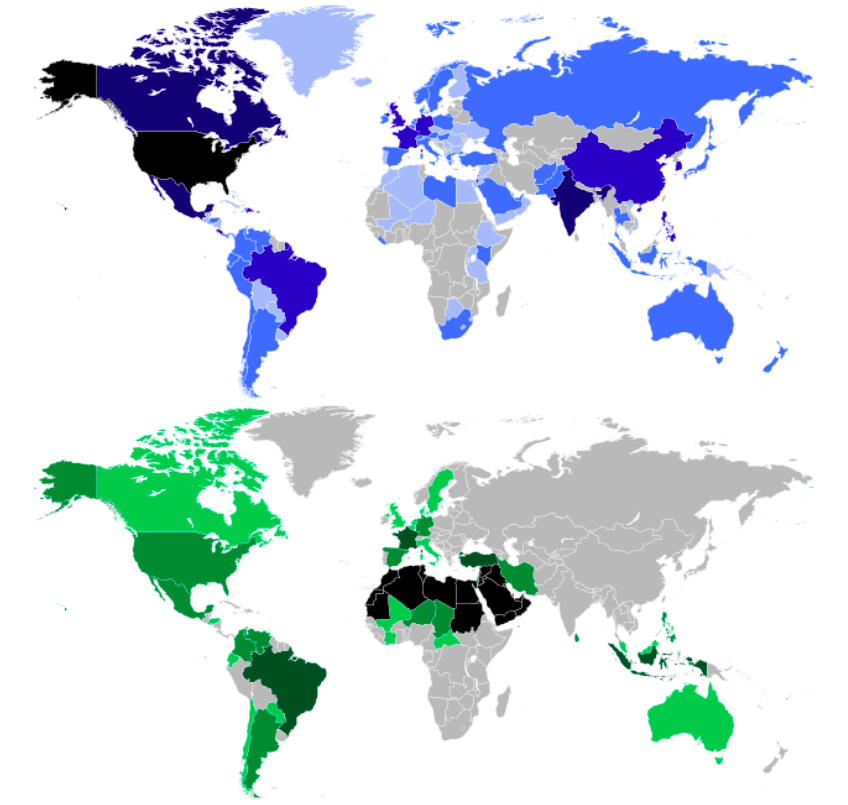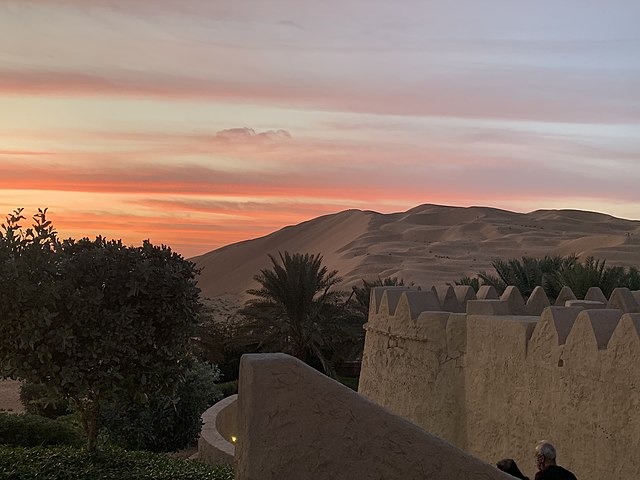Navigating Stereotypes and Cultural Shocks

Maps of the American (top) and Arab (bottom) Diasporas in the World. Photo: Wikimedia
By: Joud Sleilaty / Arab America Contributing Writer
Introduction:
In an era of globalization, the exchange of cultures has become increasingly common, leading to a growing number of unique experiences as people travel to different societies. One such cross-cultural encounter involves Americans exploring the richness and diversity of the Arab world, and vice versa. In this article, we’ll explore some common stereotypes and cultural shocks that individuals from both sides might encounter, shedding light on the nuances that go beyond the surface.
Americans in the Arab World:
- Biodiversity Beyond Deserts: Stereotypes often portray the Arab world as nothing but vast deserts, but the reality is far more diverse. Although a big part of the Arab world constitutes of deserts and a big portion of the world deserts are located in the Arab world, stunning beaches to towering mountains and even snow-covered landscapes dominate this region. The Arab World offers a mosaic of natural beauty that surprises many Americans.

Rub Al Khali desert. Photo: Wikimedia

Kornet Al Sawda Mountain, Lebanon – Photography by Wissam Shekhani – November 2011. Photo: Wikimedia
- Religious Diversity: Contrary to popular belief, not all Arabs are Muslim. The Arab world boasts a rich tapestry of religious diversity, including communities of Christians and others. Visitors might be surprised to find Catholic churches alongside mosques, showcasing the multifaceted religious landscape that defines the region.
- Business Etiquette: Business practices in the Arab world may differ significantly from those in the United States. Relationship-building takes precedence, and socializing before diving into business matters is customary. Understanding and respecting these nuances can be crucial for successful cross-cultural collaborations.
- Religious Practices: The role of religion is deeply integrated in many aspects of daily life in Arab countries. The call to prayer, or adhan, resonates five times a day from mosques, underscoring the significance of religious practices. Americans may need to acclimate to this overt expression of faith and its integration into daily routines. In some countries, the weekend even takes place on Friday and Saturdays instead of Saturdays and Sundays because of the importance of Friday in muslim communities.
- Arab Hospitality: Arab hospitality is renowned for its generosity, with guests often being treated like family. Don’t be surprised if you find yourself invited into someone’s home for coffee or to share a delicious home cooked meal, even if it’s by someone you have just met. Adapting to the importance of socializing and building relationships is key to navigating this cultural norm.
- Different Concept of Time: The perception of time in Arab cultures can be more relaxed, with punctuality often taking a back seat. Patience and flexibility with schedules become essential, as events and meetings may start later than initially planned. If you’re invited to a dinner that starts at 8, expect the rest of the party to show up past 8:30 or even 9.
Arabs in the United States:
Having migrated from Lebanon to Washington, D.C., I bring a firsthand perspective on the cultural adjustments that come with being an Arab in the United States. Additionally, my college experience has introduced me to numerous international Arab students who, like myself, recently embarked on their journey to the U.S. Together, we always talk and bond about the huge differences in the cultures we have witnessed since moving to this completely different part of the world.
- Technological Advancements: The technological landscape in the United States is extremely advanced, a revelation that became apparent upon my arrival. While this observation may not necessarily apply to individuals from technologically advanced Arab countries, for me and some of my friends, moving from an Arab country to the United States was a technological eye-opener. The prevalence of advanced technology, where almost everything can be managed through smartphones, came as a surprise to us newcomers.
- Friendship Dynamics and Social Interactions: The concept of friendships and social interactions in the U.S. differs significantly from what I was accustomed to in the Arab world. American relationships tend to be more casual, with less emphasis on extended family ties. In contrast, Arab cultures often prioritize strong connections within families and communities, making the shift to a more individualistic society in the U.S. a notable adjustment for many Arab newcomers.
- Religious Priorities: Religion holds a different position in people’s lives in the United States compared to the Arab world. While it’s common for individuals in Arab countries to follow a specific religion, and belief in God is often the norm, the U.S. exhibits a more varied religious landscape. Churches, mosques, and other religious institutions actively organize events and fun activities to maintain interest, reflecting the diverse religious preferences found in the country.
- Cultural Habits and Everyday Surprises: Simple daily habits can pose unexpected challenges for Arab immigrants. The absence of a shatafa in American bathrooms and the prevalent use of clothes dryers, as opposed to the traditional manshar for drying clothes, are notable cultural shocks. The latter, in particular, led to an unintended consequence as my clothes shrunk in the process.
- Greetings: Greeting customs differ significantly between Arab cultures and the United States. While I am accustomed to warm greetings involving hugs, handshakes, or three kisses on the cheek, a small wave often suffices when meeting someone for the first time in America.
- Restaurant Etiquette: Navigating restaurant etiquette can be a source of cultural amusement. In the Arab world, there is a cultural norm of fighting over the bill, as people vie to treat their companions to meals. However, in the U.S., the practice of splitting the bill is more common. The willingness of Americans to split the bill and accept meal invitations from others can be a shocking surprise for newcomers.

Americans with Arab Ancestry by State Map. Photo: Wikimedia
Conclusion:
Navigating through stereotypes and cultural shocks is a two-way street, requiring openness, understanding, and a willingness to embrace differences. By acknowledging and respecting each other’s unique customs and practices, individuals from the Arab world and America can forge meaningful connections, fostering a richer tapestry of global understanding and cooperation.
Check out Arab America’s blog here!








